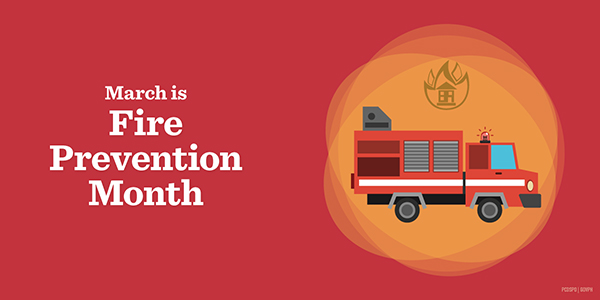March Is Fire Prevention Month
March is more than just the month that welcomes summer or the month that celebrates women. It’s also the Burn and Fire Prevention Month by virtue of Proclamation Nos. 360, s. 1989 and 115-A, s. 1966. It’s one of the hottest months of the year as well as the month when, historically, fire incidents seem to rise.

Image grabbed from Official Gazette
March is when the Bureau of Fire Protection kicks their information drives and other fire-related activities into overdrive thanks to the aforementioned proclamations. Their message has stayed the same: keep yourself and your family safe from fires.
They say prevention is better than cure, so why don’t we start things off with preventing fire hazards and being prepared for a blaze?
What you need to prevent fires at home
- Smoke Alarms. Preventing a fire starts before you see something ablaze, i.e. when you see smoke. Install smoke alarms in rooms, kitchens, and other living areas so you can be alerted to small household fires before they get out of hand.
- Fire extinguishers. You see these in every building you encounter. Since water can’t put out every kind of fire, it’s best to invest in one for your home. Look for one that’s at least an ABC-type extinguisher, i.e. one that’s good for light materials, flammable liquids, and energized electrical equipment.
- Fire exit. You can have one built for your home or simply have an emergency exit plan. As we Filipinos say, “Di bale nang manakawan, huwag lang masunugan.” (It’s better to have your house robbed than burned to the ground.)
Preventing fire hazards
Kitchen:
- Never leave your cooking unattended.
- Keep matches and lighters out of reach of children.
- Stoves must be clean and grease-free; check your LPG tank for any leaks with soapy water.
- Do not douse a burning frying pan with water. Cover it with a lid or a damp cloth.
- Unplug any electrical appliance you’re not using.
- Avoid overloading outlets or using worn-out cords.
- Do not store items on the stove top.
- Keep flammable liquids and other combustible items away from the stove when cooking.
- Replace smoke alarm batteries every six months.
Living and bedrooms:
- Do not use extension cords as permanent outlets. Also, don’t loop them around sharp objects to prevent the cords from being frayed.
- Keep your curtains away from electric fan blades.
- If your electric fan stops rotating, turn it off immediately. Make sure it’s clean and oiled regularly.
- Fix any defective electric appliance right away.
- Unplug rice cookers and clothes irons after use.
- Never smoke in bed.
- Place candles in holders or a basin partly filled with water.
- Remove dried leaves, cobwebs, loose paper, and other easy-burning debris from the living area.
Storage and garage:
- Keep these areas clean as a whistle, with items properly places for storage.
- Do not store any of these liquids in large quantities:
- Gas/kerosene
- Paints and solvents
- Motor lubricants
- Floor wax/liquid polish
- Adhesives (rugby, epoxy, and the like)
- Alcohol products
- Oily rags, newspapers, and other trash must be disposed in a safe waste bag or container.
- Clean up any oil or grease spills from your vehicles ASAP.
- Plug power tools straight into sockets; otherwise, use heavy-duty extension cords.
- Keep your garage well-ventilated to avoid buildup of fumes and heat from tools.
Due diligence is the key to preventing small fires from consuming your house. However, things can still get out of hand no matter how safe you try and make your house from fires. Here’s what to do in the event that happens:
In case of fire
- Go with your rehearsed emergency exit plan during a fire.
- Try to close the door of the burning room as well as all doors behind you as you leave. This is to try and delay the spread of fire and smoke.
- Fumes and hot air settle at the ceiling. Fresh air during a fire can usually be found close to the floor (roughly two feet up). Crawl to the exit and cover your mouth with a wet piece of cloth.
- Your life is more important than your precious iPhone, iPad, or Macbook Air. Fires can double in size every 30 seconds, so it’s best to forget your possessions during a fire and get out of the house ASAP.
- Do not go back into a burning building until a firefighter tells you it’s safe to do so. Even if a fire has been put out, there is still a chance of the roof collapsing, exposed live wires, or a backdraft.
- A backdraft is an explosion that occurs when oxygen suddenly meets very hot temperatures and fuel.
Trapped in a burning house?
- Position yourself in a room with window leading outdoors.
- Alert the people outside that you are still in the building. Shout, get a light-colored cloth and wave it outside that window… basically, do anything to get noticed.
- Seal your room. Close the doors and patch any gaps with towels or sheets to prevent smoke from coming in.
- If trapped in the upper floors of a building, collect bedsheets and foam cushions or mattresses. They’ll come in handy if you have to jump out of a window.
- Do not run if your clothes catch fire. Remember: STOP, DROP, and ROLL.
- Clear flammable debris from the window. Rip off curtains or anything else that may burn.
- As much as it pains to say it, don’t break the [window] glass. You might need it to prevent smoke from the outside coming in. Instead, open the window a little if the air outside is fresh.
Source: Official Gazette Fire Safety













